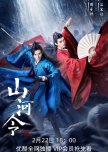
Despicable Me.
This sublime wuxia revolves around two atypical protagonists and their scorching, profound connection. A bold BL adaption that makes no attempt to suggest the relationship is just a bromance, the love story is so charismatically portrayed that it will captivate even mainstream viewers. Both protagonists are morally ambiguous and flawed characters with their own code of conduct. They fall far short of conventional da xia/大侠 or martial heroes but still manage to beguile us into caring and rooting for them.What elevates this drama is the scriptwriting , the writer put her heart into this and while I cannot compare it with the book, I couldn't be more satisfied with the drama's storytelling. Important plot and character points are planned and planted well in advance and the story unfolds in a way that pulls us into various the plot threads and the partial reveals. Many questions, including when Zhou Zishu recognizes Wen Kexing; are never clearly answered but can be surmised upon re-watch from hints in the dialogue and the characters' subsequent actions. The playful, flirtatious dialogue heavily laced with double entendre and layers of meaning with its facile parlance of idioms and ancient parables has won widespread praise from educators and broad audiences, inspiring young adults to dust off their classical texts with renewed enthusiasm. This winsome first work of a young scriptwriter sets a high bar for historical dramas going forward and puts the often lazy and tired works of more experienced writers to shame.
At surface, the backdrop and many characters are classic wuxia themes and anachronisms - various jianghu sects are vying to recover five shards of liulijia, a glazed artefact that can unlock a hidden repository of the most elite martial arts and miraculous medical manuscripts. Sound familiar? Its been done many times. But it scarcely matters because the two main protagonists, Zhou Zishu and Wen Kexing immediately sweep us away with their outrageous, titillating courtship. Gong Jun's shamelessly flirtatious Wen Kexing, is the most predatory, lecherous, and utterly delicious display of physical attraction I have seen since John Malkovich's iconic Valmont in Dangerous Liaisons. I am quite certain most of Zhang Zehan's eye rolls were not acting and I just love his improvised comment - even my fart smells good! Both actors deliver immersive resonating performances - Gong Jun with a wild vengeful ferocity behind flashes of vulnerability and Zhang Zhehan with a subtle nuanced complexity that hints at a multitude of emotions within micro expressions. Classic wuxia themes and archetypes are woven into an addictive tale of friendship, love, betrayal, loyalty, ambition, sacrifice and of course revenge.
While a bit heavy on the slow motion, the fight scenes are stunningly choreographed and delivers enough hairy, scary, dicey, slicey moments to have me at the edge of my seat. I was stunned by the raw ferocious rage and naked hatred that spilled out of Gu Xiang in the epic finale. The bloodthirsty, brutally lethal and absolutely berserk final mortal battle where the master of the Ghost Valley emits rage with the wild light of cruel insanity flashing in his eyes is without doubt the highlight of the action. This of course excludes Lao Wen and Ah Xu's exuberant fight scenes because everybody knows its really a mating dance where they are actually just ogling at each other. The story is well paced with a good balance of mystery, action and and ends spectacularly with enough twists, surprises and a breathless cruelty that pays homage to the true spirit of the genre. If I have to find fault, there are too many sects and side characters that don't advance the plot. The relationship between Zhao Jing and Scorpion King also feels off in a creepy way and even though the role is very well acted, Scorpion King's motives are not well developed. In general the villains feel rather two dimensional but perhaps this is unavoidable given how grey and complex both protagonists are.
Even though this is hands down one of the best wuxias I have seen in years, this is more of a character drama in the sense that the core characters are what really brings this story life in a differentiated way. I am going to discuss them in greater detail in the following paragraphs. Be warned there are mild spoilers so you may want to stop reading here and revisit after completing.
*Be warned - mild spoilers ahead!*
The narrator Zhou Zishu is a dark character and while he is not a villain, he is amoral and thus the story is told via the lens of a world view that is defined by personal loyalties and relationships rather than some over arching sense of morality. In Zhang Zhehan's own words, Zhou Zishu has thousands of layers and is thus the most fascinating and difficult character to both write and to portray. In this both writer and actor delivered brilliantly in striking that perfect balance of revealing not too much but just enough to create an enigmatic character with insidious lingering impact. Zishu is a cynical and disillusioned cold hearted assassin who is only bound to and motivated by his word of honor - yes for once we have an aptly titled c-drama. He doesn't blame Jin wang for his fall from grace nor does he try to avenge his fallen sect brothers because like himself, they all must live and die by their oath, their word of honor. By the time he encounters Zhang Chengling and Wen Kexing, he is resigned to his self inflicted fate and means to spend his remaining days wandering the world drinking himself into oblivion. He epitomizes despicable me, stricken by self loathing for his weaknesses, for his failings that led to the deaths of his sect brothers and Four Seasons Manor's downfall.
Zishu is pulled back into the world of the living by his promise to see Chengling to safety - his intent is to do no more than that and is indifferent to the boy's pleas to accept him as his disciple. Although he was attracted to Kexing, he dismisses his outrageous overtures and distrusts him but lets him stick around to keep an eye on him. It is only after Kexing hallucinates and calls him Zhou Zishu that his attitude changes. That must be when he suspects who Kexing is and for the first time, sees a path towards keeping his promise to his shifu by resurrecting Four Seasons Manor and thus he accepts Chengling as his disciple. But he is really only putting his affairs in order so to speak. Even though he acknowledges Kexing as his soul mate, he does not deem himself worthy of a long and happy life.
Wen Kexing on the other hand is innately a good person, who is driven by hate and vengeance into doing some terrible things. Unlike Zishu, he still longs to be a good person and deep down still believes he is indeed a good person. While Gong Jun brings the many facets of Wen Kexing from the terrifying to the vulnerable alive vividly with his expressive eyes, the character itself is a more easily understandable, angsty, revenge driven wuxia archetype. Zishu is a much darker character than Kexing and he does not save or redeem Kexing, it is actually the other way around. Although Kexing at surface gets more screen time, as the narrator that always seems to know more than he reveals, Zishu is omnipresent and invites the most mind share. As they change each other and extend their found family to include Chengling, Gu Xiang, Cao Weining and even the irascible and hilarious Ye Bai Yi, Zishu subtly comes to embrace life again.
This drama peaks spectacularly in the gorgeously shot penultimate episode that has everything - clever final reveals, plot twists, shocking, shattering losses, violent clashes and epic showdowns. I screamed, I jumped up and down, I cried, I couldn't believe my eyes! This is the way a drama should end, at its peak. Yes, there are small loose threads but overall, I am very happy with the ending. True, the final afterthought episode is a bit of a non sequitur but everything else was so spectacular I am willing to not look that hard at it. This is by far the best wuxia I have seen in many, many years and I can happily call this a perfect 9.5.
Vond je deze recentie nuttig?
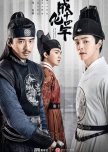
The Sleuth of Ming Dynasty
64 mensen vonden deze beoordeling nuttig
The cook, the eunuch and the chowhound - a crime solving menage a trois.
This comedic drama features a wildly imaginative yet oddly fitting crime fighting menage a trois comprising of a low (sixth) ranked magistrate (Tang Fan), a high-ranked embroidered guard (jingyi wei; Sui Zhou) and an influential eunuch (Wang Zhi) with the emperor's ear. Their paths intersect on cases with national security implications and while they have different agendas and masters, their synergistic and mutually beneficial collaborations blossom into friendship. The three main characters are well written - their bromance, hilarious antics and interactions are this drama's greatest strength.With an irrepressible grin and a wicked gleam in his eyes, Darren Chen really hams it up with his cheeky, flirtatious and sometimes deliberately irritating characterisation of the titular Tang Fan, an idealistic young magistrate who is more of a chowhound than a sleuthhound. The talented and willowy Tang Fan is a very pretty boy with delicate and vivacious features who embraces his feminine side with abandon and is passionate, emotional, naggy, petulant, petty and vengeful. This outrageously funny character writes erotic novels to supplement his puny income, lives to eat, seems extremely well acquainted with the how to but yet can't cook to save his life. He happily moves in with the gorgeously taciturn, moody, much more masculine and deadly Sui Zhou who steals Tang Fan's heart with his ability to cook a mean meal. There is enough in their interactions and suggestive domestic arrangement to get the BL fans all hot and bothered without running afoul of Chinese censorship. And then of course there is Wang Zhi, the most morally grey and dangerous of the three. He approaches relationships transaction ally - "you scratch my back I'll scratch yours" and is unambiguous about his first loyalty to king and country. Newcomer Liu Yaoyuan's portrayal of the ruthless, calculating and yet inexplicably likable Wang Zhi nicely rounds out this kinky threesome. Between them, they are able to marshal resources from the lowest to highest reaches of society to solve their cases.
Set at the heart of the capital during the Chenghua reign of Ming Dynasty, the important characters and events of the period are nicely tied into the overall plot-lines. The surrounding characters were somewhat cliche but mostly well done from the "adopted daughter" Dong'er, the miracle doctor, the Oirats, Wang Zhi's beggar informants and the rare treat of a smart and hot emperor. The cases run the gamut from crimes of passion, corruption, larceny, terrorism and climaxes in a dangerous conspiracy reaching the highest ranks of government. Most surrounding characters including the villains have recurring roles in subsequent cases which gives them dimension and avoids the confusion of excessive character introductions with each new case. The cases shouldn't be taken too seriously; while they are fun and quite interesting, they are not that original or that difficult to solve and have some logic holes and are thus unlikely to satisfy a serious crime or mystery buff. The rhythm of the investigations frequently digress into inane and somewhat childish hit or miss comedic sketches that can go on for too long. There is a slight misogynist undertone to this drama - even the likable women have unflattering traits (stupid, noisy, whiny, irrational), or worse are power hungry, traitors, extremists or come to a bad end.
The tightly choreographed action scenes are signature Jackie Chan - lethal, gripping, high impact, extremely acrobatic and fluid poetry in motion. They are not excessive, do not drag on for too long and avoid the mid-combat slapstick moments he used to be so fond of; all good changes. The camerawork is stunning and very artistic, approaching movie quality. They obviously spared no expense with this and it shows.
For those who grew up on Jackie Chan, the Sleuth of Ming Dynasty is a fun romp down memory lane. There is a bit of the artistic Jackie Chan, the wacky whack-y Jackie Chan, the comedic Jackie Chan, the high testosterone Jackie Chan, the innovative Jackie Chan, the crass Jackie Chan and finally and pleasingly, the mature Jackie Chan. I outgrew his flicks ages ago - after awhile I found the hair rising stunts, high speed chases and exaggerated comedic routines repetitive, shallow and draining. So I am pleasantly surprised to see in this drama that maturity has toned down and balanced some (not all) of his more extreme inclinations while still remaining essentially Jackie Chan. It is also nice to see the uniquely Jackie Chan inspired Hong Kong wu da pan (武打片) sub-genre with its chauvinistic, contradictory, cynical, sarcastic yet sentimental and idealistic spirit has evolved for the better but is still innately the same.
This is highly entertaining and enjoyable if you don't look too hard at it or seek profound meaning. It is not always my sense of humor and the cases are solid but not exceptional so I rate it an 8.5 but I can see why others would call it a 9.0 or better.
Vond je deze recentie nuttig?
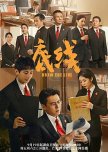
Justice is blind and not heartless.
I have never had a good impression of China's opaque legal system so I was both curious and skeptical about Draw the Line. This drama is a fascinating tour of the inner workings of China's grassroots level judicial system. It shines a surprisingly candid spotlight on gaps in the Chinese judicial system from rapid economic growth, modernisation, changing social values and the proliferation of the internet and social media.Fang Yuan is the presiding judge at the Xingcheng District Court, a local people's court of first instance which handles both civil and criminal cases. Fang Yuan's division handles civil cases while criminal matters are adjudicated by his colleague Song Yufei, a deputy chief judge of the intermediate people's court. What surprises me most is how hands on the grassroots judges are in the Chinese legal system. They do a lot of field work themselves from directing the gathering of evidence to personally interviewing plaintiffs, defendants and witnesses. The role of lawyers is so passive and marginalized it is as if they are for decorative purposes only. For civil cases, the court first seeks to resolve conflicts through court sponsored mediation. If an agreement, is reached, it becomes legally binding once it is reviewed and documented by a judge. Mediation can be a draining process, especially when dealing with less educated, unreasonable and belligerent citizens. Thus beyond legal knowledge it takes a combination of investigative and persuasive skills and a healthy dose of patience to be effective as a grassroots judge in China.
The arrival of Ye Xin, a young researcher from the Supreme Court is met with speculation and trepidation by the close knit community at the Xingcheng District Court. She is an annoying character in the beginning because she has no practical experience, and adopts a rigid by the book approach to interpreting the law. Experienced grassroots judges like Fang Yuan and his mentee Zhou Yian are more pragmatic about bridging the inevitable gaps between static legal codes and the myriad complexities of real life cases. Still it is never easy to figure out where to draw the line between the letter of the law and the spirit of the law. Beyond the heavy case load, the courts also face the challenge of social media, where cases are tried in the court of public opinion on distorted facts. Although the judges do their best to weigh the the practical, moral and humane aspects of their decisions, they don't always get it right. They have their own flaws, biases and personal or familial pressures. These dynamics set Chinese Supreme Court down the path of judicial reform, where case law is increasingly implemented instead of just statutory law.
The impeccably curated cases create a fascinating mosaic of moral, familial, commercial and social issues great and small confronting the Chinese public today. They are based on thought provoking and relevant real life cases; some of which have sparked public debate and controversy. The drama is very even handed about presenting both the plaintiff and defendant's point of view. The writers very effectively showcase resembling cases to illustrate the range of different human emotions, motives and outcomes. There are cases where two sons are driven to kill because of their mother, sexual harassment cases with different power dynamics and common reasons for the breakdown of marriages and related child custody disputes. From the mundane and petty to the serious and complex, the cases strike a riveting, sometimes heart rending chord because we have all read about or heard about or experienced something similar. At the same time, these cases deftly illustrate the many challenges faced by grassroots judges. They are the everyday heroes who navigate the grey areas of the law and morality with compassion to deliver justice that is blind and not heartless.
The cast in this drama needs no introduction and does a stellar job in drawing out the complex human aspects of the cases. Jin Dong delivers a multi-faceted Fang Yuan who is everything to everyone at work - a stern and impartial judge, a tireless and persuasive mediator, a wise mentor and a playful colleague. This leaves him with much less to give at home as a father and husband. We see a very down to earth version Cheng Yi as the introspective Zhou Yian, the young judge who must surely cut his own hair! He convincingly navigates a crisis of conviction after making some mis-steps. Both Yian and Cai Wenjing's Ye Xin are the characters who show the most growth in this drama but the characters that move me most are either defendants or plaintiffs in some of the more heart rending cases.
The best, most thought provoking case to me is the one about the roommates that is analogous to tripping a friend to escape a bear attack. Even though all the cases are interesting, there are too many of the cases in the back half that personally entangle various court personnel. This requires repeated suspension of disbelief in terms of how impartial and self sacrificing the various protagonists managed to be. It also highlights in my opinion an area that still needs judicial reform, which is how conflicts of interest are handled. It seems there is no requirement for judges to recuse themselves when their colleagues end up as defendants. The ending case is just too personal with too many coincidences and conflicts and an outcome that I find the least equitable with some defendants getting off too lightly while others are very harshly indicted. It is not the right note to end on and as a result I rate this an 8.0 instead of an 8.5. Overall a highly recommended, eye opening, thought provoking and fascinating watch with heart felt performances from some of my favourite Chinese actors.
Vond je deze recentie nuttig?

The truth will make them free.
This is a review of The Blue Whisper in its entirety - I will not review Part 1 and Part 2 separately.The Blue Whisper is an enthralling fairytale about how love can be both imprisoning and liberating. Set in a fantasy world where sky immortals or fairies instill order and earth immortals or demons are prone to chaos, romantic entanglements between these two clans are forbidden. This kind of inter-species ban pretty much ensures that sky immortals and earth immortals fall for each other with reckless impunity.
Ji Yunhe is the most consummate spirit master among Wanhua Valley's elite cadre of demon tamers. She longs desperately to escape from the Valley; to see the world and be free. Chang Yi, a magnificent and powerful merman is captured by the wicked, conceited Shunde fairy, who tasks the Valley to tame and enslave him. Seeing it as her ticket to freedom, Yunhe vies with her sect brother, the Valley Master's son Lin Haoqing, to complete the task. Where Haoqing attempts to torture Chang Yi into submission, Yunhe beguiles him with kindness, friendship and love. Yunhe successfully manipulates and entices the naïve Chang Yi's heart for her own selfish ends. Along the way, the player gets played as Yunhe falls for his sincerity and sees that it is wrong to enslave such a pure hearted and innocent being. But even though she sacrifices to free him, her well intended lies set in motion a cycle of half truths, sacrifices. betrayals and captivity that ensnares them both. After a long and difficult quest for freedom with many trials, they understand that it is the truth that makes them free.
The story is set in a stunning, enchanted fantasy world with a vivid magical color palette, mystical sets and the best costumes and styling I have seen in a long time. The CGI is well done but errs on the side of being heavy handed at times. The storytelling however, leaves quite a bit to be desired. There are way too many artifacts, especially pearls with endless magical properties to conveniently save the day. And when dead characters keep being revived, both the element of surprise and the emotional impact is diminished. In addition to unnecessary side characters, there are altogether five well developed CPs that explore repetitive tortured themes of taboo relationships, deception, betrayal and how love can both be both confining and liberating. A few of these side stories are not interesting and too long winded and the frequent alternating between too many CPs and plot threads breaks the momentum of Yunhe and Chang Yi's story and makes the main plot stagnate as well. Thus I did not feel Yunhe and Chang Yi's chemistry or get invested in their storyline until Part 2 where many threads converge and the storytelling improves markedly.
I am really happy to see Dilraba take on the role of such a complex and conflicted character as Yunhe; one that undergoes so much anguish and such profound change. Though she made me feel her love and pain many times, I still like her portrayal of the cunning, manipulative and self serving Yunhe in the beginning best. As for Ren Jialun, he is a master of the unspoken and of intense suffering in silence. I can't fault his performance and am simply tickled that he is willing to do so many kiss scenes with the exquisite Dilraba. They look so incredible together in this production that they must be the most gorgeous costume drama couple by a wide margin. That said, while Chang Yi is intensely single minded when it comes to love, loyalty and righteousness, this is not innately a complex character and thus the role doesn't quite do Ren Jialun justice in terms of broadening his acting repertoire.
The character that compells me to the point of stealing the show is Lin Haoqing; brilliantly and sublimely articulated by Xiao Shunyao. From the get go, I was more drawn to Haoqing's chemistry with Yunhe - they are on the same wavelength, bound by history and layered and complex emotions. Like Chang Yi, Haoqing is torn between duty and Yunhe but unlike Chang Yi who is more reactive, he proactively schemes ahead, takes bold risks and tries for win win outcomes. Lin Haoqing and Yunhe get to do all kinds of interesting and important things that advance the plot while poor Chang Yi is relegated to safeguarding Beiyuan and dealing with the petty, boring issues of the fox clan. Chang Yi only comes in useful in mighty showdowns and even then, his power ups are marred by unflattering camerawork that catch him scowling angrily as if he is trying to take a dump. I can't help but feel that the plot short changes my beloved sour faced Ren Jialun, an actor I am super fond of. That said, I only have praise Xiao Shunyao's ability to make me feel Lin Haoqing's suffering no less than Chang Yi and Yun He's. I hope good things happen to this handsome and compelling actor.
Though I don't consider Xian Shi or Shunde's motives as villains that convincing, both roles are very well acted. In fact, Guo Xiaoting's Shunde can give one of my all time favorite villains, Angelina Jolie's Maleficent a run for the money. Guo thrusts herself into the role with mesmerising relish and wicked abandon. A dash of dark humor would have rendered the portrayal incomparable. As for the rest of the (too) extensive cast, even though a few characters got screen time that was disproportionate to the substance of their storylines, the roles are well performed enough to win a place in my heart. The friendship, support and sacrifice from Fan Zhen and Lishu as well as the hilarious Kong Ming and Luo Luo is clearly what gets Yunhe and Chang Yi through the loneliness of their many trials and tribulations. And I just simply love the idea of such a youthfully adorable Tian Jun.
This drama finishes strongly with an exciting and well chareographed final confrontation. But I won't lie, the ending is a bit of a blue whimper. There are simply too many reversals that make me roll my eyes. As for the final 5 minutes, it succumbs to c-drama's nasty habit of wanting to be all things to all people. Nonetheless, it is still an acceptable finale that from a certain point of view can be seen as quite fitting. The storytelling in Part 1 tried my patience and is at best an 8.0 but I really enjoyed Part 2, which I can happily rate a 9.0. Since I don't think it makes sense to rate both parts separately, this is an 8.5 overall. As of end April, this is my personal top ranked drama for 2022.
Vond je deze recentie nuttig?

Can't judge a book by its cover.
Judge Dee is one of the most widely adapted and iconic ancient Chinese detective figures in popular culture. Di Renjie, or Judge Dee was a prominent Tang Dynasty official and twice chancellor to Empress Wu Tzetian. In the 19th century, Dutch sinologist and diplomat Robert Van Gulik translated an 18th century novel by an anonymous author Dí Gōng Àn/狄公案/Celebrated Cases of Judge Dee, into English. He went on to write numerous other Judge Dee mysteries, increasingly crafting Judge Dee in his own image. Van Gulik's books are regarded as a cultural bridge between East and West. They were devoured by the Chinese diaspora long before Tsui Hark fanned the flames with his wildly popular Detective Dee movies.Judge Dee's Mystery/大唐狄公案 loosely adapts nine cases from Van Gulik's novels for the small screen. This drama has notably high production values with lavish sets and costumes designed to create an immersive visual experience. The cases are well crafted with meticulous attention to detail and pay homage to Judge Dee's reputation as a people's hero; a champion of truth and justice for the common people. The cases highlight the discontent at some of Empress Wu's policies and shortcomings of the Tang Code, China's earliest legal code. Di Renjie gained many insights on the struggles and aspirations of the common citizens as magistrate of many important provinces across the empire. This shaped him into a great statesman and reformer in his later years; a chancellor often known to stand up to the formidable Empress.
This is the kind of drama that I should love - its my favorite genre featuring my favorite Chinese detective, set in my favorite Chinese dynasty and is helmed by a few of my favorite actors. The fight scenes are fantastic and the whole thing just looks gorgeous and bloody expensive. Which just goes to show you, you just can't judge a book by its cover. Because even though there are some really great moments, overall this drama just bored me silly.
The problem with the cases is that the four episode are too long when the villain is usually obvious from the beginning. There is not enough development of the suspects or the victims to make the audience care about the why-did-it. The audience also does not get to participate in the solution. Instead, the intricacies of the how-did-its are revealed as flashbacks in Judge Dee's mind's eye. The cases do get better in the latter half as they tie into Judge Dee's past and are shored up by the appearance of characters like Diao Xiaoguan (Zhang Ruoyun) and Lin Fan (Jiang Yi). Even then, the writing tends to tie the minute details together well while leaving big gaps on important things. Thus it is never fully explained what Diao Xiaoguan's motives were or what terrible thing the young scion of a noble household did that got him disowned and left to fend for himself.
The biggest issue with this drama is that Zhou Yiwei pretty much carries the entire crime-solving team by himself. None of the supporting characters are well designed and there is zero chemistry between Ma Rong, Qiao Tai and Judge Dee. This is made even more obvious when Deng Xiaoguan shows up and there is a tangible difference in the dynamics between everyone. Both of Dee's sidekicks appear and disappear inexplicably in the middle of a case as and when the plot requires. Ma Rong is written to be a comically obnoxious character but there is nothing funny about her obnoxiousness. This is the obvious the weak link in the cast and one that is utterly lacking in charisma that unfortunately gets too much airtime. Inasmuch as Zhou Yiwei and Wang Likun deliver a heart-stopping and mature portrayal of attraction and love at first sight, sadly Cao An is written to be a blank character; an elegant musician well past her youth clinging to a silly girlish fantasy over a highwayman (face palm). She only serves decorative purposes until the final case, where she finally gets to shine with her bravery and her foolishness.
In conclusion, this is a visually stunning production that stays true to its source material in terms of setting and thematic elements. However, despite some exciting and well choreographed action scenes, it fails to deliver truly captivating mysteries and is bogged down by lackluster supporting performances. While the cases in Strange Tales of Tang Dynasty (2022) are only a tad more tightly written, the humor and fantastic crime solving team dynamic elevates that series over this one. That said, Judge Dee's Mystery is not a terrible way to pass some time even though it ultimately falls short of making a lasting impression. I rate this Seasons 1 a 7.5/10.0. Season 2 has been filmed and should air by early 2025.
Vond je deze recentie nuttig?
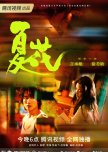
Let life be beautiful like summer flowers...
This tantalizing and poignant love story captures the spirit of carpe diem. It opens with a young girl's chance encounter at the hair salon. She is aroused by a strong and silent stranger from the way he caresses her ears and washes her hair. For most girls, it would stop just there; a titillating fantasy not to be acted upon. But He Ran is not like most girls. She throws herself at Xiao Han shamelessly; not one whit bothered that he is well into his prime. Twist and all, this is a simple and very cliched romance plot that hinges on the chemistry between the leads and whether they can convince audiences to root for them.He Ran's relentless pursuit of Xiao Han can very easily come across as crude and thirsty but Xu Ruohan gets this tricky portrayal mostly right down to the small nuances. She is just an artless young, girl headily experiencing infatuation, desire, and possibly even love for the very first time. She can be incredibly petulant, unreasonable, and childish, like the protected and spoiled little rich girl she is. But she taunts and tempts him with the instinctive provocativeness and burgeoning sensuality of a child-woman. The way she looks at him with her heart in her eyes and the effervescent joy in her smile made me shake my head at the futility of Xiao Han's efforts to evade her charms.
As for Xiao Han, his genuine attempts to resist the ardent allure of this captivating young temptress is just the right touch. He rightly has misgivings - she is too young and they are from different worlds. Xiao Han is a man of few words; a gentle giant who is very still and seemingly unmoved by her attempts to seduce him. Only the smallest microexpressions give him away - the hint of a smile, a tensing of his incredible jawline, a barely perceptible slow sidelong glance, and a whisper of innuendo in his tone. While Xiao Han clearly looks and is more mature, the relationship doesn't come across as exploitative largely because He Ran is the instigator and calls most of the shots. Of course, it helps that Jerry Yan does not look a day over thirty and the only offensive thing about him is how well he wears those sleeveless wife-beater T-shirts.
Their love story unfolds against a lush, almost surreal romantic palette drenched with deep and lush saturated colors of the riotous blooms adorning Xiao Han's intimate seaside home. The couple's sultry chemistry permeates the screen, captured mesmerizingly by the director's avant-garde and sensual visual composition style. The superbly curated soundtrack supercharges the narrative with all the right emotions at every critical juncture. I was invested in their romance the moment I heard the first song, Cantopop hit (半點心 A Drop of Your Heart). At the time, they had barely even met! I am so busy being a Peeping Tom that it takes me a while to notice that the plot doesn't move much. He Ran is just escaping into Xiao Han's world and their relationship is built around "ask me no questions and I will tell you no lies". They are both secretive and repeatedly fail to communicate. Thus despite its addictive beauty, theirs does not bear the hallmarks of a lasting relationship.
He Ran and Xiao Han's relationship shortcomings are amplified by the too coincidental to be true gender reversed second age-gap romance. There the couple actually dares to call each other out and are open about themselves and their doubts and constraints. That said, their initial attraction is too tropey and not convincing and it is a major subplot that develops too late in the main plot line; right after He Ran and Xiao Han's relationship peaks. This long-winded and often boring digression annoyed me and disrupted the momentum of the main romance. Their sizzling chemistry also highlights a more adult passionate intensity that seems missing in He Ran and Xiao Han's encounters.
The Chinese title of this drama 夏花 / Xià Huā or Summer Flowers, comes from Rabindranath Tagore's poem "Let life be beautiful like summer flowers..." After Shakespeare, Tagore is the most widely read and well-loved foreign poet in China. Thus there is already a lot of foreshadowing in the Chinese title. But I think it is not that important how He Ran and Xiao Han's story ends. Because the story's real message is about living in the moment and daring to live and love with no conditions or expectations for the future. That they did and like summer flowers, their love bloomed with wild abandon drenching the earth with the radiant, ecstatic colors of beautiful life. With a little bit of help from Uncle Han, who is just the best fairy godfather ever.
As for the ending, I didn't like it. Not at all. It diminishes both main characters. It is why even though I love many parts of this drama, I can only rate it a 7.5. A better ending would have gotten an 8.0-8.5 from me. I will elaborate on why I am so disappointed in the ending below. It is of course a major spoiler so please don't scroll down if you have not finished watching the drama.
Warning - major ending spoiler way down below.
Major Ending Spoiler
To me killing off a character is a lot better than killing the character of the character. And that is what leaving the door open for some ambiguity does - both He Ran and Xiao Han's characterizations suffer as a consequence. The ending should have been clear and decisive. The drama consistently builds up to it. This loosey-goosey ending makes the timeline messy and creates unnecessary loose ends. Did Xiao Han not accompany He Ran to seek treatment? What about his promise to care for her? Surely he was not growing flowers at home while she was fighting for her life thousands of miles away. But what really takes the cake is He Ran's unreasonable demand that Xiao Han waits for her and loves no one else. It is utterly selfish and insensitive. What if his first love had demanded that of him and he never gave He Ran the time of the day? Dying is easy, it puts her beyond all further suffering and emotion. From then, the suffering begins for the survivors. She sets her mother free but poor Xiao Han is supposed to miss her for the rest of his life? Did she ever even truly love him? Wow! This cop-out ending made me intensely dislike He Ran instead of remembering her poignantly as the brave young girl she was at the beginning. A girl who chose to live life gloriously if briefly instead of wallowing in self-pity.
"Let life be beautiful like summer flowers and death like autumn leaves." - Stray Birds by Rabindranath Tagore
Vond je deze recentie nuttig?
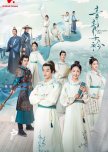
Poetry in motion.
This is a really fun and adorable school romance drama that will steal your heart. It carries the underlying message that education should be a universal right but it does not necessarily produce a moral person.Wen Renjuan is swept off her feet by a seemingly wicked man from a different world in a brief but unforgettable encounter. They reunite at the prestigious Zhuxiu Academy after Luo Qiuchi wins a place in a national poetry competition. Of course it is impossible back then for even elite young women to be formally educated, in a co-ed academy no less! But since the setting is so much fun and it avoids the muss and fuss of the cross dressing trope, let's let that one slide. This is mostly a coming of age character drama that explores class conflict and how different students of Zhuxiu Academy respond to competition, envy and disappointment in academics and relationships.
The best thing about this drama is watching the character and relationship development of the two main couples - it is literally poetry in motion. Both couples are lovable and so convincingly "belong together" I have a hard time picking a favorite. Renjuan is the character that grows the most in the drama - she blossoms from a timid girl into a feisty, clever and simply irresistible young beauty who fights fiercely for her beliefs. Lu Xiaolu is simply a joy to watch in this role; she has the cutest, most natural facial expressions and gestures that convincingly conveys the innate goodness of Renyuan's nature. The way initial attraction turns into love and how Qiuchi and Renjuan grow together as a couple as they get to know and understand each other is just breathtaking. I particularly enjoyed watching Qiuchi temper his natural possessiveness and protectiveness towards Renjuan to give her room to make her own decisions and judgements even when he knows she is not on the right track. With quiet, gentle but unyielding insistence, Wenjuan bends Qiuchi to her will and helps him accept and let go of the bitterness of his childhood losses. This is one of the best, most realistic couples I have seen in terms of how their relationship grows from strength to strength.
In sharp contrast to Qiuchi and Renjuan, Hang Ruxue and Qing He are a much more reserved, less demonstrative couple. But it is clear their feelings for each other are conveyed less with words and more with deep soulful glances and actions. It is just as moving to watch the skittish, love struck Qing He's confidence grow as she wins the heart of her strong and silent general. Xie Binbin's Ruxue is so intimidatingly endearing I hope to see him in many more lead roles from now. I also love the camaraderie between both couples and how they support each other. My favorite character however has to be the boy emperor - he cracks me up every time!
Where this drama falls down is in the plot and the pacing. It opens really strongly with a fresh and exciting initial meeting between the leads. We get a lot of great action and thrilling twists in the first 10-15 episodes of the drama and the plot unfolds at an engaging pace. However, the overarching plot peaks too early and then lapses into a series of charmingly heartwarming but bland school related short plots that lack complexity and are easily resolved. It helps that it hones in on the dynamic between the couples and is so well done that I didn't mind that the plot threads water. However, both relationships peak shortly thereafter and while the lovey dovey couples are adorable, the pace is slow from then.
The main problem is that the villains are revealed very early on but they hang around until the bitter end. It does not help that the writing gets sloppy and illogical things happen in the ending arcs. For example, Renjuan's hard won martial arts skills evaporate in thin air so that she can be helpless and easily overcome by the villains as is required by the plot. The villains are also repetitive and unimaginative with shallow and tropey motives. The final (usually best) villain could not get any sympathy from me, I just rolled my eyes at his boring histrionics. It is not a lot to ask that the most complex villain in the story does better than that! At least two of the villains could have been tackled together and this could have been a much better drama with about 10 episodes fewer.
I consider this a heartwarming and good character and relationship drama with some truly entertaining moments. And I am sure you will watch one of my favorite and most hot, squeal-worthy hilarious a moments at end E5/beginning E6 at least two times... I rate this a very enjoyable 7.5 but I had it at 8.0 until about the last 10 episodes.
Vond je deze recentie nuttig?

The Dark Side of the Moon.
This drama is about how a power couple that is well matched in terms of cunning, ambition and capability scale the upper echelons of banking and finance during 1930s Shanghai. The narrative vividly captures the wild, morally ambiguous, highly speculative, wheeling and dealing nature of the mafia dominated banking and finance industries during that early period of industrialisation.Cheng Yizhi is a scrappy, enterprising, self educated young orphan with a knack for numbers and finance who is raised by a kindly shopkeeper. He starts out in a lowly position at a bank but his talent propels his rapid advancement to become the protege of banking magnate Huang Ruhong. Wu Lizi is the pampered daughter of a distinguished banker whose world falls apart when her father is framed and commits suicide. Hell bent on revenge, she marries Yizhi and ruthlessly uses his access to banking circles to investigate her father's downfall. Mutual lack of communication and a terrible, irreversible decision by Lizi ruins their marriage but leads to a very rewarding business partnership where they build a bank together.
Wu Lizi is one of the most selfish, devious, manipulative, ruthless and utterly charming female protagonists I have come across. It is such a treat to get complex and fascinating female characters like Lizi. That is why I kept watching this even though at one point I was enraged and disappointed to the point of almost dropping. I still don't like how they wrote Lizi to lash out so viciously and vindictively with such heavy consequences but I am glad I kept going because she really moved me with her stoic remorse and acceptance later on. Even though there were some rough edges to Cai Weijing's performance, overall she is tough, willful, curiously vulnerable and so charismatic that I could literally see how she tied Yizhi, Charlie and Xu Du up into knots emotionally.
Zhang Xincheng delivered a most excellent performance in this drama as Cheng Yizhi, a cynical character that well understands the dark side of the moon due to his upbringing on the rough side of town. So he is the ultimate nemesis of dark characters like Huang Ruhong because he can get into their heads and narrowly manages to stay one step head of them. In sharp contrast, he seeks the light in all of his dealings and finances some of the most promising industrialists of the day. At the onset Yizhi goes toe to toe with crooked businessmen and corrupt politicians with equally scheming and wily tactics. But as the story advances and his dark secrets are revealed, the character is whitewashed and becomes too perfect, so understanding with such shiny plated plot armor that I had to roll my eyes. I needed more flaws or to see him be a little bit petty or selfish and to play dirty sometimes. Instead Charlie, a far more interesting and lovable character rises to the occasion to do all the slightly shady things that need to be done in order to stymie their unscrupulous rivals. Nonetheless the lead couple has superb chemistry and the way their relationship blossoms from mistrust and suspicion into an incredible partnership on multiple levels is one of the drama's strengths.
The business subplots are quite interesting, well written and the financial concepts are kept at a simple enough level for laymen. The characters however are less well written and notably Lizi, is not consistently written. For such a smart character she does some retarded things that can only be put down to sloppy writing. Huang Ruhong's somewhat creepy and unfathomable hard on for Yizhe is also unconvincing and not in character for the leader of the criminal underworld. Indeed the true love triangle in this drama is the one between Ruhong, Yizhe and Lizi. This was such a promising antagonist at the start but gets sidelined as the ending arc digresses into yet another patriotic fight the Japanese invaders plot. I would have preferred to see a more satisfying cat and mouse takedown of this smart antagonist play out properly. Towards the later episodes, many key characters are gratuitously killed off to squeeze out the obligatory tears expected of a Republican period drama. This backfires as I only felt very sad for two of the deaths which only highlights that the other characters were two dimensional ones that I never got invested in.
There are many enjoyable and unique aspects to this drama that make it worth watching even though it falls down on messy plot, sloppy character writing and a lame ending arc. Charlie was my favorite character and his wit, style and wisdom saved the show. Overall this is just a 7.5 for me despite strong acting by the leads. And MVP Charlie (Wang Zijian).
Vond je deze recentie nuttig?
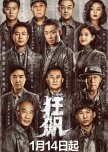
The road to perdition.
To put it simply, The Knockout knocks it out of the park with its audacious portrayal of an anti-villain as the main protagonist. Spanning twenty years, it is a masterful account of how a struggling everyman insidiously strays onto the road to perdition. The stage is set brilliantly from the get-go to manipulate us into sympathizing with a character who does terrible things. We are blinded by their humanity and blame the system for failing them, forcing the oppressed to become the oppressor.Gao Qiqiang starts out as a humble fishmonger doing his best to raise his younger brother and sister. When thugs threaten their livelihood, he stands up to them but is framed and arrested. An upstanding young officer An Xi suspects he was bullied, books the case leniently, and tries to keep his tormentors at bay. Ironically with small acts of kindness, An Xi empowers Gao Giqiang and propels him in unimaginable ways. The complex and sincere bond of empathy and indebtedness that is forged between the two men is the linchpin of this story. Their most pivotal character turning points and moments of truth play out on the neutral ground of a humble noodle shop. where much is revealed with few words.
It is clear from the outpouring of accolades that Gao Qiqiang is an iconic portrayal that put the hitherto under-appreciated Zhang Songwen on the map. Gao Qiqiang is a visionary mastermind who draws inspiration from Sun Tzu's Art of War. He is dangerously underestimated because of his amicable facade and his disarming affection for and vulnerability with those he cares for. The way he embraces fashion to please his wife to how he willfully blinds himself to his brother's weaknesses is both touching and relatable. When crossed, threatened, or betrayed, he is unforgiving and cruel to the point of depravity - no one is safe from him. He is chillingly ruthless and implacable when it comes to imposing his own brand of loyalty and justice. Like any good sociopath he oozes regret but in truth has no qualms about sacrificing his generals. He "makes it right" by caring for their families sincerely and with deep gratitude. He is bound by a very misguided code; one that is ruthless and amoral yet oddly authentic and honorable. Zhang Songwen embodies this character so well that some believe he is not acting and insist he should be at least investigated, if not locked up.
An Xi is both Gao Qiqiang's savior and his nemesis. More than anything, he is his biggest victim. This character makes me sad and mad. He is well meaning and does the right thing with all the wrong outcomes. Zhang Yi was reluctant to accept the role of An Xi, feeling he wasn't a good fit and wouldn't able to pull it off. But Zhang Songwen's Gao Qiqiang would not be so compelling without Zhang Yi's An Xi. It is their incredible rapport and ability to silently communicate that makes the small screen seem huge. Zhang Yi's expressive gaze and more subtle style is the perfect foil for Zhang Songwen's flamboyance and charisma. While I admired and sympathised with Gao Qiqiang, An Xi is the one that often moved me to tears. His speaking eyes frequently implore Gao Qiqiang to be a good man and convey bottomless dejection that gives lie to the goofy smiles he flashes at Meng Yu. The aging of characters over three distinct time arcs across twenty years is rarely captured as well as it is here. But it is Zhang Yi that simply nails this part - he is wary and tired but not quite beaten; the righteous flame in his eyes are dimmed but at the core still burns hot.
This drama is impeccably cast and is a who's who list of China's best actors, all of whom deliver immersive performances. The director's incisive lens meticulously peels back the many layers of the multi-faceted characters and their intricate relationships. The female characters are written to be strong and impactful beyond their screen time. Li Yitong really takes her acting to another level as Meng Yu; it is by far her strongest, most memorable role to date. Her screen chemistry with Zhang Yi is unexpected and endearing. And then there is Gao Ye's simply sensational Chen Shuting, the ultimate gangster's moll - cool, stylish and fearless. The way she menaces the wits out of Gao Qiqiang is one of the drama's highlights for me. There is a lot more on-screen violence in this drama than I expected. While the worst of it takes place off-screen, it is so well staged that it is more visceral and blood thirsty in my overactive imagination.
The rich plot builds to a shocking, unpredictable and devastating climax about a third of the way through. Then it loses momentum and in the final ten episodes it limps toward a predictable ending. This is somewhat to be expected as this was produced in partnership with the state, the nationalist message is inevitable.I really did not care about the party's anti corruption task force and yawned through their heroic sweep through Jinghai City to weed out the endemic corruption that had seeped into the cracks at every level of the bureaucracy. It is clear that there were some cuts and at least one character is whitewashed but I don't think it changes the gist of the final outcome. The final confrontation between Gao Qiqiang and An Xi saves the entire arc and there were enough characters I cared about including Meng Yu that it was still overall a decent arc. All considered, I am not as dismayed by the way this ends as others are. The fact that the government always wins is a foregone conclusion and not a spoiler in any crime and/or corruption themed Chinese drama. But in this case, I don't really think it shines that great of a light on "the good guys". I mean where were they for twenty years? And I am not sure the "good guys" win here. Poor An Xi is definitely is not a winner; in fact no one wins. Indeed audiences overwhelmingly empathise with Gao Qiqiang. Thus this is actually a very dark crime story with a surreptitiously bold and critical ending.
This spectacular crime thriller is a must watch. The first 30 episodes feel like a tour de force that can easily be rated 9.0/9.5. The rest are more at the 8.0 level so 9.0 feels about right for my final rating.
Vond je deze recentie nuttig?

Buns of Steel.
Blossoms in Adversity / Xī Huā Zhǐ/惜花芷 is the story of superwoman Hua Zhi's feel-good romp through feudal China. When Imperial Censor Hua dares to criticize the monarch, he is exiled along with all the men in his family. A bevy of helpless women and young children are left to fend for themselves. Hua Zhi takes charge and rallies the women together to triumph against overwhelming odds. When she flexes her buns of steel, no feat is beyond Hua Zhi! She parleys a candied hawthorn business into a pastry and restaurant empire, picks up stray royal children, foils a few palace plots, build schools and a canal, rescues the Hua family men and even manages to find time to fall in love! All in the space of a 2-3 years!!! Phew! Even superwoman would surely stagger from sheer exhaustion!This narrative paints a distressing picture of how oppressive life was for women in hierarchical ancient Chinese patriarchal society. The best part of this drama is how in order to survive, the women defy social conventions, set aside petty differences, learn to trust each other and work together towards shared goals. While the sheer scale of their financial and other achievements are preposterous, there is something very cathartic and satisfying about how flamboyantly they flourish. The storytelling is squarely centered on Hua Zhi and speeds through many of the supporting character arcs, leaving their motivations and struggles under-developed. This is a pity because family dramas like this are most compelling when important supporting characters are given enough agency to be the main characters of their own arcs.
This is one of those dramas that is best enjoyed superficially and with heavy suspension of disbelief. Upon closer scrutiny, the overarching empowerment theme is contradicted by some of the sub-plots. I was disturbed by the different treatment of domestic abuse in Hua Jing and Hua Xian's case. But what I disliked most was what happens to Hua Rong and her child. It is as if she learned nothing from her family's struggles about resilience in the face of adversity. There are a few poorly developed sub-plots like this that the writers raced through without thinking carefully about the messaging.
As much as I like Zhang Jingyi, this is not her best role. Her interpretation of Hua Zhi is too perfect, too calm, too understanding and too reasonable. This has led to many Mary Sue comments about the character. But Hua Zhi is actually written to have many flaws - she can be over confident, she cannot mind her own business, she is reckless and like her grandfather, she cannot hold her tongue. In the canal arc, she is the architect of her own downfall but because everyone unites around her, she never suffers any consequences for her actions. This character has too much plot armor and is already so smart and capable that she shows virtually no growth from beginning to end.
Hua Zhi's relationship with Gu Yanxi is similarly whitewashed to the extent that it appears too ideal to be true; it lacks passion, conflict and intensity. Hua Zhi lets Gu Yanxi off too easily for deceiving her in the beginning when any normal person would be at least a little bit angry at him. She also never communicates any discomfort with his role at the Security Bureau; indeed she seems quite happy to use his authority there to serve her purposes. Thus, it came as much as a surprise to me as it must have to Yanxi that it could be a deal breaker for her! So much for their so called mature, open and communicative relationship! I don't know why young actors like to make their characters so perfect all the time and have such a hard time embracing more complex but perfectly natural human relationship dynamics and emotions.
Hu Yitian delivers a more nuanced portrayal of Gu Yanxi as the emperor's sharpest knife. His fight scenes are phenomenal and he is menacing and ruthless as the commander. He shows us he is a different person; more open, at ease and happier when he is with Hua Zhi. While this is one of Hu Yitian's better roles to date, he shies away from showing us the true extent of his affection for the emperor and his inner conflict. This is a missed opportunity because Hai Yitian delivers a compelling portrayal of the lonely, paranoid and manipulative emperor. Because Hu Yitian's portrayal of Gu Yanxi does not meet him halfway, the emperor's affection for his nephew comes across as borderline obsessive and a lot more one sided than it really is.
Even though it seems her character Shaoyao is dumbed down from the novel, Lu Yuxiao is once again a scene stealer in this drama. This kind of beguilingly innocent, simple minded savant kind of character is extremely difficult to portray well but Lu Yuxiao pulls it off brilliantly. She doesn't get enough screen time to steal the show but I was more invested in her character than I was in Hua Zhi who is too perfect to be relatable.
The ending of this drama really cracked me up. It is one of the few times that the villain actually saves the day by doing what Hua Zhi and Gu Yanxi could never have done. Although it is also possible that Gu Yanxi learned his lesson not to look for needles in hair stacks and had the good sense to show up a just a tad late at the ceremony. Despite some flaws, this is a very appealing feel-good drama for those seeking light entertainment. My rating 8/10.
Vond je deze recentie nuttig?
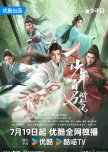
Shao Nian Bai Ma Zui Chun Feng
48 mensen vonden deze beoordeling nuttig
One that loved not wisely but too well.
Once upon a time in Beili, there lived a woman who was simply too beautiful 倾国倾城/qīng guó qīngchéng; she could fell a city with one look and fell a kingdom with a second look. This kind of woman is a menace to mankind that can only be locked out of sight in a gilded cage. This is the cautionary tale of a brave man, one that loved not wisely but too well who dared to set her free. And his one true friend who tried to help him do the right thing.Dashing Youth 少年白马醉春风 or Young White Horse Drunk in the Spring Breeze is the highly anticipated prequel to 2022's dark horse hit high fantasy martial arts drama The Blood of Youth 少年哥行. Like its predecessor, it is a youthful coming of age story about friendship, adventure and the spirited idealism of youth. Even though Baili Dongjun is the titular character, it is equally his best friend Ye Yun's villain origin story. They are parallel characters; both innate martial artists and scions of the Beili empire's founding families. As boys, they vowed to storm the martial world together when they grew up; Yun as the Sword Deity and Dongjun as the Liquor Deity. After the Ye family's downfall, they are destined to go down opposite paths. Dongjun lives a charmed life; making a name for himself as Li Changsheng's final disciple at the prestigious Jixia Academy; surrounded by new friends like Sikong Changfeng and Beili's Eight Talented Gentlemen. He reunites briefly with Ye Yun, who now calls himself Ye Dingzhi. In sharp contrast, Ye Dingzhi's path is a lonely one, full of obstacles, inequities, betrayals and brief snatches of happiness.
At its core, this is quite a straightforward story that is cluttered in the storytelling. There are too many digressions into the Who's Who of the martial world and and its pretentious rankings. While the fan service is terrific, such a dazzling array of too hot to handle swordsmen put my exploding ovaries in danger of apoplexy. The surfeit of hot filler characters with shallow side stories distract from the main arcs. For all their fancy swords and pompous rankings, all we see are a few showy poses and twirls before the CGI takes over and screen explodes in a gory orgy of light and digital creatures. While the CGI is well done, it is a big let-down not to see a few well choreographed live action fight sequences.
I was happy to see Hou Minghao dub himself as Baili Dongjun. It makes a big difference in how the character comes to life. While his acting is still a work in progress, he plays a character he can relate to and it shows. Ye Dingzhi is a more complex and intense role, one that He Yu pulls off charismatically. Even though he does questionable things, I empathized with him every step of the way. It would have been nice to see more of Xia Zhiguang's Sikong Changfeng. The humor and camaraderie between all the dashing youths is one of the drama's highlights. Even though the romances are not convincingly written or well developed, I liked all of the couples enough to root for them. The role of Yi Wenjun should have been more sympathetically portrayed instead of just as helpless, selfish and willful. The lovely Ye Yao is only Dongjun's muse, her character doesn't get to do much.
The irreverent Li Changsheng/Nangong Chunshui is the funniest, best acted and most engaging character in this story. Even though his arcs don't tie well with the main plot, the narrative visibly sags after his exit. His parting words to his disciples 凭心而动/píng xīn ér dòng or "act according to your heart" captures the spirit and idealism of youth that is Dongjun's lifelong mantra; one that years later, he passes on to his disciple Tang Lian. He helps Dingzhi steal the bride because Wenjun was not willing and therefor it is wrong to force her. It is the simple, absolute truth that trumps the cynical calculations driven by politics and expedience. He never wavers from this belief. It is true that Wenjun is a selfish, weak and dislikable character who makes terrible decisions with devastating consequences. But she was still wronged in the first place. Thus like Dongjun, I understood, even tried to empathize with her until she was too easily manipulated into returning to Tianqi. That was not only a stupid decision, it showed that she simply did not trust and love Dingzhi enough to wait for him. Poor Dingzhi, he never got any breaks. Even the love of his life failed him at the end. Through sick and sin, it was always and only Dongjun who remained his one true friend.
There is little new in the political plot that wasn't revealed in dialogue and flashbacks in TBOY. Which would be fine if they fleshed out the character stories and the succession struggle instead. But those are dealt with cursorily with Ruojin left as a blank cartoon character and the relationship between the brothers not explored. TBOY romanticizes Prince Langya as a tragic hero, the noble uncrowned king of Beili. In this prequel, he is the character that disappointed me most. He tore up his father's will out of misplaced loyalty and his own selfish desire to live an unrestrained life. He never made the case for why Ruojin was more worthy, supported him unconditionally and in the case of Wenjun, enabled him even though he knew it was wrong. There was never a so called greater good or do or die reason why Wenjun had to marry Ruojin, it was simply a matter of imperial privilege and entitlement. They could have escaped with his help and everything could have been so different. But I don't hold him solely responsible; there were so many malign forces at play and bad decisions that there is plenty of blame to go around.
The ending to this story leaves that bitter after taste that the bad guys won. It makes too convincing a case that a too beautiful woman who can topple kingdoms must be safely locked out of sight so she can do no harm. Both Wenjun and Dingzhi paid a high price for their mistakes but too many people who pushed Dingzhi down the dark path got off unscathed. In the novel, Dongjun has an epiphany about his own dào/道 or convictions in the middle of his fight with Dingzhi. He switches sides and punches the daylights out of the emperor instead. He scolds him: "She does not like you, why force her to marry you? She has escaped and is living a happy life, why lock her up again? You are the emperor with a harem of 3000. My brother only loves one person. Live and let live. Learn from your brother, he can even let you have the throne, why can't you let my brother have one wife?" Even though it changed nothing it was something that had to be said. Without this scene, Ruojin is never called out or held accountable for his role in starting a war over a woman. Instead it is Dingzhi who is destroyed and villainized for trying to hold on to a grass hut in a tiny corner of the world where he was happy. It is very hard to feel good about a story that ends like this.
This messy and disappointing prequel was in some ways limited by what was already canon in TBOY but still could have been better on multiple fronts, Nonetheless it is a chock full of eye candy and a fun watch if you don't look too hard at it and ignore the inconsistencies with TBOY. Even though this is a critical review I enjoyed the drama. I am just mad because it had the potential to be almost as good as TBOY. But it wasn't and so I can only rate this 8/10. I am still happy to recommend it , especially if you loved TBOY. If you liked Wuxin before, you will love him more after knowing his parent's story.
Vond je deze recentie nuttig?
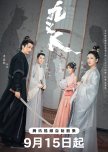
Those who seek revenge dig two graves.
This is a heartbreaking and sobering revenge drama about an ancient Me Too movenment by nine commoners seeking justice. The two main protagonists, Rulan and Meng Wan are apprentices at Yanyu Tower, whose exquisite embroidery are prized by the imperial palace. Underneath his polished and elegant facade, Yanyu Tower's proprietor and master embroiderer Wu Lian is the worst kind of predator; one who uses his power and privilege to repeatedly manipulate and abuse the young women working for him. When Rulan has the audacity and tenacity to seek legal redress, most including her bestie Meng Wan hesitate to help her; knowing how stacked the system is against them. Ultimately her plight and her conviction inspires nine people to devote their entire reason for existence to taking Wu Lian down and obtaining justice for Rulan and in some cases themselves. There are no fairytales in this drama; their stories are utterly devastating; alternately moving me to tears and making my teeth clench and my blood boil.This drama is not for the faint hearted and comes with a ton of trigger warnings. It is ruthless and brutal in terms of its scathing depiction of the unbalanced power dynamics between the powerful and the powerless. It convincingly articulates why regardless of consequences, Rulan, Meng Wan and their friends decide to take a stand against a clever, powerful and ruthless opponent. Their efforts are stymied at almost every turn and many of them pay the dear cost of justice. Wu Lian is almost too smart a villain and too well resourced. It is dismaying to see these nine avengers fall for the same traps over and over. In desperation, some of them take unnecessary risks and make terrible sacrifices with scant payoff in their attempt to gather enough evidence to indict him.
This is a large cast with consequential roles that deliver all around strong performances. Hu Yixuan's portrayal of Rulan's disillusionment, agony, bravery and forlorn quest for justice is harrowing, piteous and ultimately tragic. Wu Qian also impresses as the icily soft spoken, resolute avenging angel and mastermind of the revenge plot. As for Wu Lian, it is rare to encounter such an intelligent and downright despicable villain, masterfully acted by Qiao Zhenyu. All of the support roles come together well to paint a picture of common people from all walks of life with dreams and goals that get disrupted as they come together to get justice. The thief Li Chunfeng and the embroideress Jue Ming charmed and moved me into rooting for them most.
This kind of drama that tackles such a difficult subject matter is unlikely to appeal broad audiences. It is well executed for the most part but tends to be unnecessarily melodramatic in the later arcs. The villain origin backstory left me unmoved and is not convincing. I would expect Wu Lian's father's concubine to have impacted him in a more positive way. While this story ends in a realistic way, I am not satisfied. Wu Lian's enablers who covered for him repeatedly get off way too lightly. Finally the way this wraps up sends too strong a message that those who seek revenge dig two graves. Revenge becomes their sole purpose and end game to the extent that I wonder - did they really win? There is just too much collateral damage and sacrifice even though Humpty Dumpty can not be put together again. Maybe it would have been better to just live well. I needed to see at least one of the victims recover from this and go on to have a good life. The final What If episode 25 made me feel worse not better. I struggle with how to rate this. As much as I applaud the topic, the acting and how emotionally invested I got in the story, it left me with a hollow feeling after the ending arcs. It is still a good, thought provoking watch but I can only rate this a 7.5/10.0.
Vond je deze recentie nuttig?

Tale as old as time.
The Legend of Shen Li is a highly entertaining xianxia with a terrific starting hook. Injured while fleeing an unwanted marriage, Shen Li crashes into the mortal realm in her innate phoenix form. Mistaken for a chicken, she is rescued and healed by Xing Yun, a sickly ginseng salesman. Never in my wildest dreams did I think I would be shipping an unseemly attachment between a haughty chicken and a weak but insolent mortal. Their hilarious interactions and witty repartee had me grinning like a fool. This has to be the first CP that I got invested in before the FL properly meets the ML.While I find Legend of Shen Li quite enjoyable, it is a tale as old as time and I am not just making fun of Xingzhi's age. This kind of forbidden love story between a lonely, crusty old god and a much younger one is the staple of this genre. This one is written more as a character story so there is little plot movement until the second half of the drama. The plot itself leans heavily on well known xianxia tropes with a modern, role reversal approach. What makes it special is that it is well executed, the main CP has scorching chemistry, it is anchored by a stellar cast and tongue-in-cheek dialogue has deep and heart tugging undertones. This is an excellent entry-level xianxia that will thrill and delight newcomers to the genre the most. While die hard fans of the genre will certainly enjoy the fresh take on old themes, they may find the plot predictable after the early arcs.
For me, the mortal realm is always the most interesting xianxia arc and this is no exception. It is at the same time the most disappointing arc in terms of missed opportunities. It is too short and half the time Shen Li is an angry CGI bird. Shen Li's feelings for Xing Yun developed so quickly I felt shortchanged on the how and the why she fell in love. Worse, their story is overshadowed by the two utterly heart wrenching ill-fated love stories. To some extent, the narrative coasts on the residual heat from Princess Agents and assumes the audience is already invested in the main CP. The issue is viewers who did not watch that may not feel the chemistry between them. The arc ends so abruptly that it barely dawns upon me that Shen Li's affections could be one-sided. She very high-handedly falls for a helpless mortal and doesn't give him any say in the matter because she knew it to be transitory. This is quite sad and complex and it is a pity the narrative dealt with it too cursorily.
As someone hungering for closure from Princess Agents, I am stoked to report that the chemistry between Lin Gengxin and Zhao Liying burns as hot as ever. This drama is generous to a fault in fusing passionate love scenes with humor and moving romantic moments. I find myself chuckling at how hot and flustered Shen Li gets by Xingzhi's shameless flirting until the veiled pathos behind Xingzhi's careless words hits me and makes me tear up. Both characters are designed to recycle the strengths of their previous collaboration without taking much risks. Notably, there is no extra dimension or complexity to Zhao Liying's role or portrayal. She once again delivers in spades what she does best from the brilliant, combative glitter in her eyes to her signature awesomely bad-ass fight scenes. I would have liked to see more facets to King Bicang beyond the fierce warrior with a deadpan expression who is casually cruel to CGI animals. There is more scope for Lin Gengxin to shine as Xingzhi is a contradiction; the most powerful and yet the most powerless being in the three realms. I was impressed by Lin Gengxin's heart wrenching and nuanced portrayal of this so very alone ancient being who will crack a joke to stop your heart from breaking for him.
As a couple, Shen Li and Xingzhi are too perfect for each other - their world view is largely aligned and besides the one bombastic obstacle of an existential crisis for the realms, there is no real conflict in their relationship. While they experience some acutely angsty moments, they are all short lived. Most of the intense and lingering agony in this xianxia actually comes from the three devastating side love stories. Both characters are fully realised beings that don't grow much. That is left to the likes of Furong who is my favorite character in the first half of the narrative and the character that shows the most growth overall. His limelight in the second half is stolen by Lady Jin who is by far my favorite character and one who saves the draggy second half of the show for me. I find the villains quite boring and archetypal and those roles are also the least well acted. Even though Shen Li and Xingzhi come together in a moving and masterful ending climax, the finale is too much of something I have seen many times before. I did not enjoy the extended ending fight sequences and the heavy handed CGI.
Despite the unoriginal plot, this is an excellent character driven story. I was invested in many characters beyond the leads - Furong, Youlan, Qing Ye, Feng Lai, Mofang, Lady Jin and the indignant Cluck Cluck. The dialogue uses comedy brilliantly as a gateway to the profound in highlighting complex, deep and at times tragic existential themes. I enjoyed the conversation about how if we can work together against evil, we may no longer need gods to be our babysitters. I also felt a shiver of fear in this age of AI at the idea that as creators, one day we will become an existential threat to our creation. Overall a very enjoyable and highly recommended funny and intelligent xianxia that I am happy to rate 8.5/10.0.
Vond je deze recentie nuttig?
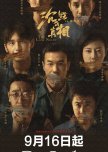
Scorched earth.
This is an artfully related dark crime thriller about a long, life blood sucking and soul destroying quest for justice. A body in a suitcase, a bomb scare, an incriminating old photograph and a looming terrorist threat captures headlines and puts acclaimed investigator Yan Liang on the case. He quickly discovers that these events are linked to a decade old cold case. The narrative navigates three time periods and alternates skillfully between the original team on the case led by prosecutor Jiang Yang (Bai Yu) and the present investigation led by Yan Liang as both investigations proceed down a parallel path. This is done so seamlessly it is not at all confusing; indeed all of the characters, events and clues flow fluidly and clearly. The pallete is sparse and dark toned consistent with the title and tone of the drama.While the mystery and suspense part of the drama is very well written and doesn't reveal itself too soon, this is really more of a character drama about Jiang Yang, a brilliant young prosecutor with a lot of fire in his belly. Without a doubt, this is Bai Yu's best acted role to date. His signature gigantic forehead was so well concealed I didn't recognize him for awhile. The way his Jiang Yang's indomitable idealistic youthful spirit is extinguished into a subdued, quiet desperation and almost but not quite defeated acceptance is one of the most moving and nuanced portrayals I have seen in a long time. He deserves to win awards for this role. I wish I could say the same for Liao Fan's Yan Liang but I was not wowed by his crime solving brilliance which is supposedly signified by pondering and obsessive ball bouncing. Despite some failed and misplaced attempts at humor, Yan Liang's present day team also lacks the rapport and chemistry that oozes out of Jiang Yang's "hot pot" team. Anchored by Bai Yu's powerful performance and a solid cast overall, there is still an unbalanced or somewhat lacking feeling. This is amplified by the fact that the adversary is just powerful with unlimited resources and tentacles everywhere. There is no well developed mastermind at work - all we see are a bunch of petty villains who employ rather crude tactics to suppress the truth.
The drama peaks at the end with the final reveal in a truly masterful and heart wrenching performance by Bai Yu. Yet I am left feeling unsatisfied; I am missing the satisfaction of a showdown and fitting consequences for the villains. Indeed the repercussions seem far worse for those who resort to scorched earth methods to uncover the truth. Thus to me, this is a dark drama - it far from glorifies the quest for the truth and justice. It leaves a lingering sense that it is far more worth while to just live a good and happy life.
This is an excellent watch but be warned, it is dark and sad. I don't consider it to be quite in the same league of the Bad Kids and give it an 8.5.
Vond je deze recentie nuttig?
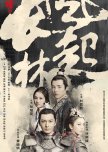
Nirvana in Fire 2: The Wind Blows in Chang Lin
27 mensen vonden deze beoordeling nuttig
Closure
While NIF2 works as a superb standalone story, it is best appreciated if watched after NIF. Also be aware some of my comments may be spoilers for NIF so best not to read this if you haven't watched it.NIF2 is the story of the changing fortunes of the Changlin family as together with the Liang empire, they navigate a changing of the guard. While the story skips a generation, the ghost of Lin Shu "haunts" the drama. After all, the powerful Changlin Army is the legacy Prince Jing created in Mei Changsu/Lin Shu's memory. Xiao Tingsheng, the now elderly Prince of Changlin instills in his family the same moral values, duty, honor and loyalty that were innate to Prince Jing and Lin Shu. His sons Xiao Pingzhang and Xiao Pingjing grow up with and share a deep bond beyond blood ties with their imperial peers, especially the Crown Prince and their cousin Xiao Yuanqi. Their proximity to the throne and unbalanced power in the court is feared and envied by many. This sets the stage for political plots and intrigue at the highest levels of the court that pose many challenges for the Changlin family. This brings the free spirited and fun loving Pingjing back from the famed Langya hall to aid his more responsible elder brother Pingzhang, the heir who already shares their father's duties.
In NIF, we can only imagine what young Lin Shu's life was like. NIF2 invites us to experience being in the bosom of a close and loving family at the epicenter of power in the empire. We laugh and we cry with them, their friends are our friends, their foes our enemies, their hopes our hopes and we feel the pain of their losses in an acute and very real way. The script-writing and plot in this drama is deep and masterful in a way that rivals that of NIF. While political plotting, revenge, justice, loyalty, morality, duty and envy are still strong themes, it dives more deeply into relationships between sovereign and subject, parent and child, husband and wife and siblings and cousins while exploring the fine line between good and evil and nature vs nurture. Unlike NIF, the story does not revolve around one core character but a number of key characters. Like NIF there are many grey characters and even the good characters are very realistically written with their own strengths and flaws. These lead characters evolve over time as the story-line spans a generation shift and explores how these characters deal with change. The second half of the drama focuses on the younger generation and this is where weakness in the acting emerged as these demanding transitions are played out by younger and less experienced actors. That said, overall the cast was very strong and well populated with many veteran actors.
Newcomer Liu Haoran's Xiao Pingjing was stellarly portrayed from start to finish. He managed to "grow up" from the immature, playful, outspoken, impetuous and slightly irresponsible younger son to be a skilled pugilist, brilliant general and military tactician, the rising star of the Changlin family. This actor immediately conveyed that Pingjing must be what a young Lin Shu (whom we never met in NIF) would have been like. He is the young actor to watch coming out of NIF2. Sadly his love interest Lin Xi was played by a limited and forgettable young actress. Lin Xi's father was killed before she was born so she is an aloof character, a talented and capable lady doctor. She had to make a terrible, controversial and life altering decision in this drama. This is an awesome part that a better actress could have killed. This one wore a perpetually tragic expression and when pressed to defend her decision she overacted, wailing in a completely out of character way. There was no chemistry between Pingjing and Lin Xi and as a couple, they were not convincing. Pingzhang and his wife Meng Qianxue on the other hand were touchingly in sync with each other. Fortunately this is not a love story although there is more romance than NIF. Both female leads were strong and well written characters but only Meng Qianxue's role was well acted.
In the second half of the drama, cousin Xiao Yuanqi also comes of age, clawing his way up despite the disgrace his father (the youngest son of Prince JIng) brought on to their branch of the family. Yuanqi is a chameleon and the most interesting, complex and empathetic character in the entire drama. To be fair it is a challenging role, one that actor Wu Haochen was not up to. While his performance was technically good, it was also pedestrian and boring. He simply lacks onscreen presence and charisma. I didn't want to watch him and would either tune out or tune into whoever he was sharing the screen with. This was too critical a role for them to have miscast so badly. The character itself was exceedingly well developed, it just didn't come to life in the right way. It is why for me this drama is not a perfect 10 even though the script, plot and story-line can hold its own against NIF.
NIF broke my heart because even though Lin Shu/Mei Changsu got his justice, it was his final act. What he lost could never be recovered. I was inconsolable for a long time. Watching NIF2 was cathartic because NIF2 shows us that his legacy and everything he stood for lives on in all the lives he touched. And despite its own tragic moments, in NIF2 we get to imagine that maybe Lin Shu came back to fulfill his final promise. That gave me the closure I badly needed.
Vond je deze recentie nuttig?


 52
52 185
185 8
8




















